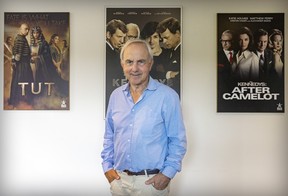Fewer English-language projects are being filmed here, an alarming trend many blame on the province’s lack of support.

Article content
English-language film and TV production is on the decline in Quebec.
It only makes sense that the vast majority of films and TV series shot ici are made in the language of Arcand. But some local anglo producers say it is increasingly hard to get their projects made here. They say it’s partly because of the province’s film tax credits not being competitive enough and partly because of a lack of will by the provincial government to support anglo production.
Advertisement 2
Article content
Article content
Until 2017, there was often more than $200 million worth of English-language production in la belle province. In the late 1990s, the English production tally was more than $350 million for two straight years. But in the last few years, the total has dropped considerably. It went as low as $120 million in 2021-2022 and was $137 million this past year.
Michael Prupas, one of the leading anglo producers here, founded Muse Entertainment 25 years ago. He remembers when the city was a hub for English-language filming and is alarmed by the drop in local anglo production in recent years.
One of the main types of content Muse produces is TV movies destined for the international marketplace. The Westmount-based company is now making most of those movies in Ontario because that province offers more generous tax credits.
The movies are produced for American networks, including Hallmark and Lifetime, but they are Canadian-content movies and fulfill the requirements for Canadian funding.
In Ontario, the company can get an extra regional tax credit if it shoots outside of the Toronto area. Quebec also has a regional tax credit, but the production company has to have its head office in a region outside Montreal. Virtually all anglo production companies in Quebec are based in Montreal.
Article content
Advertisement 3
Article content
Prupas, who is chairman of the Muse board, said they will shoot about $40 million worth of TV movies this year — and all will be shot outside of Quebec because of those more lucrative tax credits. Muse can save about $200,000 on each movie by filming in Ontario, he said.

“The recognition of the English language as a tool of business by the Quebec government is terribly lacking, to say the least,” Prupas said. “They should recognize that the bread and butter of a significant portion of the working population (in the Quebec film and TV business) is driven by their ability to deliver material in English.”
Prupas underlines that when they shoot in English in Quebec, the vast majority of the crew members working on the productions are francophones. In other words, they are not just generating revenue for anglophones.
He also notes that the biggest amount of English-language production in Quebec is made by Hollywood producers, who can access tax credits for foreign filming in Quebec. Local Canadian English production is a much smaller slice of the overall pie.
Pupas is also concerned that the money from provincial funding agency SODEC earmarked for English-language production often goes to francophone producers and directors shooting in English, rather than to anglo producers and directors.
Advertisement 4
Article content
Many well-known local francophone filmmakers, like Denys Arcand and Xavier Dolan, have shot projects in English.
“The notion that they should be supporting the local English-language production community is lost on them,” Prupas said.
Johanne Larue, who is director general of audio-visual production and development at SODEC, said the agency is doing all it can to encourage English Quebec filmmakers.
She says it is very rare that they receive film projects from anglo producers that reflect the life and society of English Quebec.
“They’re often films that have no connection to the life of anglos in Quebec,” Larue said.
“I don’t know if you remember the film (produced) by Harry Gulkin, Lies My Father Told Me. It’s one of my favourite films,” Larue said. “When I saw this when I was much younger, I was blown away. It showed the life of anglo Quebecers in Montreal. But where are these films?
“We’d like to receive more projects like that, films that reflect the vision of anglo Quebecers. We’re waiting for them. We’re hungry for them. But that’s not what we usually receive,” she said. “But I have a lot of hope for the next generation.”
Advertisement 5
Article content
The majority of SODEC money goes to French-language production. It has to give a minimum of 80 per cent of its funding to francophone projects.

One of the films Larue pointed to as a good example of an anglo Quebec film that represents the community is Boost, a gritty 2016 film about young car thieves in inner-city Montreal. The 2016 film garnered critical acclaim and numerous award nominations.
Ironically, Boost did not receive funding from SODEC. The producers applied three times and were turned down each time.
Frederic Bohbot, who produced Boost, said it’s tough to make films in the language of Spielberg here.
“They’re hard to get funded,” Bohbot said. “I believe Johanne Larue when she says she wants to support English cinema. But she’s stuck between a rock and hard place. No one is ever happy with how much money SODEC is funding people with. If you’re giving to English cinema, all the nationalists are up in arms.”
Bohbot noted: “When we did Boost and it got nominated for eight Quebec Cinema Awards … and I heard people were like, ‘What the f— is this Boost movie?’ No one had heard about it. … It is what it is. We’re a minority.”
Advertisement 6
Article content
Bohbot says one of the unfortunate byproducts of this lack of financing for English production is that anglo talent tends to leave town for greener pastures.
Related Stories
Michael Solomon says it’s not surprising that SODEC’s main focus is franco production since “the biggest hits are French-Canadian films.”
Solomon produced the werewolf film My Animal, which premiered at the Sundance festival earlier this year. He had wanted to shoot it in Quebec but instead chose Timmins, Ont. because that province offered better incentives.
“I would say the biggest reason we moved the movie to Ontario was the tax credits, and it kills me,” Solomon said. “I’m setting up another movie now and I want to make it in Montreal even though it’s going to cost me. At the end of the day, I want to be close to my family.”
He also laments the fact that there aren’t enough English films and TV series here directed and written by anglo Quebecers.
Advertisement 7
Article content
Article content




